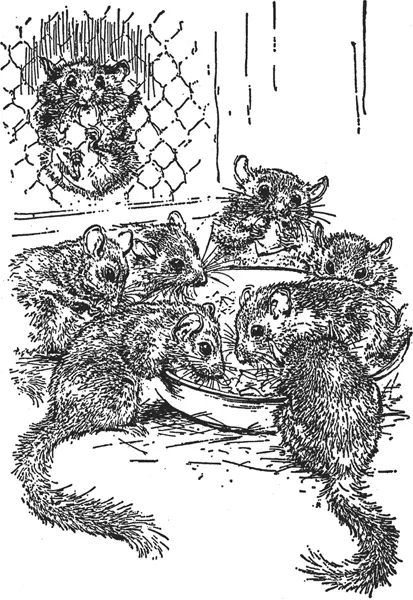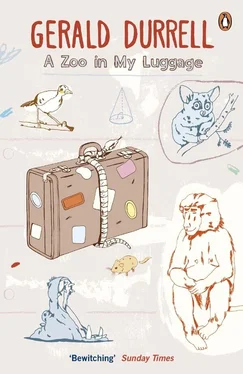Gerald Durrell - A Zoo in My Luggage
Здесь есть возможность читать онлайн «Gerald Durrell - A Zoo in My Luggage» весь текст электронной книги совершенно бесплатно (целиком полную версию без сокращений). В некоторых случаях можно слушать аудио, скачать через торрент в формате fb2 и присутствует краткое содержание. Жанр: Природа и животные, на английском языке. Описание произведения, (предисловие) а так же отзывы посетителей доступны на портале библиотеки ЛибКат.
- Название:A Zoo in My Luggage
- Автор:
- Жанр:
- Год:неизвестен
- ISBN:нет данных
- Рейтинг книги:4 / 5. Голосов: 1
-
Избранное:Добавить в избранное
- Отзывы:
-
Ваша оценка:
- 80
- 1
- 2
- 3
- 4
- 5
A Zoo in My Luggage: краткое содержание, описание и аннотация
Предлагаем к чтению аннотацию, описание, краткое содержание или предисловие (зависит от того, что написал сам автор книги «A Zoo in My Luggage»). Если вы не нашли необходимую информацию о книге — напишите в комментариях, мы постараемся отыскать её.
A Zoo in My Luggage — читать онлайн бесплатно полную книгу (весь текст) целиком
Ниже представлен текст книги, разбитый по страницам. Система сохранения места последней прочитанной страницы, позволяет с удобством читать онлайн бесплатно книгу «A Zoo in My Luggage», без необходимости каждый раз заново искать на чём Вы остановились. Поставьте закладку, и сможете в любой момент перейти на страницу, на которой закончили чтение.
Интервал:
Закладка:
He sat on a bougainvillaea stem, clutching it tightly with his little pink paws, and looking about him through a quivering windscreen of whiskers. Then, very rapidly, and apparently with his sense of balance completely unimpaired, he jumped down on to the verandah rail, from there to the floor, and then scurried across to the line of cages against the far wall. Thinking that perhaps he was a bit bewildered I picked him up and returned him to the bougainvillaea. But as soon as I released him he did exactly the same thing again. Five times I put him in the bougainvillaea and five times he jumped to the verandah floor and made a beeline for the cages. After that, I tired of his stupidity and carried him right down to the other end of the verandah, put him once more in the creeper and left him, thinking that this would finish the matter.
On top of the dormouse cage we kept a bundle of cotton waste which we used to change their beds when they became too unhygienic, and that evening, when I went to feed them, I decided that they could do with a clean bed. So, removing the extraordinary treasure trove that dormice like to keep in their bedrooms, I pulled out all the dirty cotton waste and prepared to replace it with clean. As I seized the bundle of waste on top of the cage, preparatory to ripping off a handful, I was suddenly and unexpectedly bitten in the thumb. It gave me a considerable shock, for not only was I not expecting it, but I also thought for a moment that it might be a snake. However, my mind was quickly set at rest for as soon as I touched the bundle of cotton waste an indignant face poked out of its depths and Bertram chittered and squeaked at me in extremely indignant terms. Considerably annoyed, I hauled him out of his cosy bed, carried him along the verandah and pushed him back into the bougainvillaea. He clung indignantly to a stem, teetering to and fro and chittering furiously. But within two hours he was back in the bundle of cotton waste.
Giving up the unequal struggle we left him there, but Bertram had not finished yet. Having beaten us into submission over the matter of accommodation, he started to work on our sympathies in another direction. In the evening, when the other dormice came out of their bedroom and discovered their food plate with squeaks of surprise and delight, Bertram would come out of his bed and crawl down the wire front of the cage. There he would hang, peering wistfully through the wire, while the other dormice nibbled their food and carried away choice bits of banana and avocado pear to hide in their beds, a curious habit that dormice have, presumably to guard against night starvation. He looked so pathetic, hanging on the wire, watching the others stagger about with their succulent titbits, that eventually we gave in, and a small plate of food was placed on top of the cage for him. At last his cunning served its purpose: it seemed silly, since we had to feed him, to let him live outside, so we caught him and put him back in the cage with the others, where he settled down again as if he had never left. It merely seemed to us that he looked a trifle more smug than before. But what other course could one adopt with an animal that refused to be released?
Gradually we got everything under control. All the cages that needed it were repaired, and each cage had a sacking curtain hung in front, which could be lowered when travelling. The poisonous-snake boxes had a double layer of fine gauze tacked over them, to prevent accidents, and their lids were screwed down. Our weird variety of equipment – ranging from mincers to generators, hypodermics to weighing machines – was packed away in crates and nailed up securely, and netting film tents were folded together with our giant tarpaulins. Now we had only to await the fleet of lorries that was to take us down to the coast. The night before they were due to arrive the Fon came over for a farewell drink.
‘Wah!’ he exclaimed sadly, sipping his drink, ‘I sorry too much you leave Bafut, my friend.’
‘We get sorry too,’ I replied honestly. ‘We done have happy time here for Bafut. And we get plenty fine beef.’
‘Why you no go stay here?’ inquired the Fon. ‘I go give you land for build one foine house, and den you go make dis your zoo here for Bafut. Den all dis European go come from Nigeria for see dis your beef.’
‘Thank you, my friend. Maybe some other time I go come back for Bafut and build one house here. Na good idea dis.’
‘Foine, foine,’ said the Fon, holding out his glass.
Down in the road below the Rest House a group of the Fon’s children were singing a plaintive Bafut song I had never heard before. Hastily I got out the recording machine, but just as I had it fixed up, the children stopped singing. The Fon watched my preparations with interest.
‘You fit get Nigeria for dat machine?’ he inquired.
‘No, dis one for make record only, dis one no be radio.’
‘Ah!’ said the Fon intelligently.
‘If dis your children go come for up here and sing dat song I go show you how dis machine work,’ I said.
‘Yes, yes, foine,’ said the Fon, and roared at one of his wives who was standing outside on the dark verandah. She scuttled down the stairs and presently reappeared herding a small flock of shy, giggling children before her. I got them assembled round the microphone and then, with my fingers on the switch, looked at the Fon.
‘If they sing now I go make record,’ I said.
The Fon rose majestically to his feet and towered over the group of children.

‘Sing,’ he commanded, waving his glass of whisky at them.
Overwhelmed with shyness the children made several false starts, but gradually their confidence increased and they started to carol lustily. The Fon beat time with his whisky glass, swaying to and fro to the tune, occasionally bellowing out a few words of the song with the children. Presently, when the song came to an end he beamed down at his progeny.
‘Foine, foine, drink,’ he said, and as each child stood before him with cupped hands held up to their mouths he proceeded to pour a tot of almost neat whisky into their pink palms. While the Fon was doing this I wound back the tape and set the machine for playback. Then I handed the earphones to the Fon, showed him how to adjust them, and switched on.
The expressions that chased one another across the Fon’s face were a treat to watch. First there was an expression of blank disbelief. He removed the headphones and looked at them suspiciously. Then he replaced them and listened with astonishment. Gradually as the song progressed a wide urchin grin of pure delight spread across his face.
‘Wah! Wah! Wah!’ he whispered in wonder, ‘na wonderful, dis.’ It was with the utmost reluctance that he relinquished the earphones so that his wives and councillors could listen as well. The room was full of exclamations of delight and the clicking of astonished fingers. The Fon insisted on singing three more songs, accompanied by his children, and then listening to the playback of each one, his delight undiminished by the repetition.
‘Dis machine na wonderful,’ he said at last, sipping his drink and eyeing the recorder. ‘You fit buy dis kind of machine for Cameroons?’
‘No, they no get um here. Sometime for Nigeria you go find um … maybe for Lagos,’ I replied.
‘Wah! Na wonderful,’ he repeated dreamily.
‘When I go for my country I go make dis your song for proper record, and then I go send for you so you fit put um for dis your gramophone,’ I said.
‘Foine, foine, my friend,’ he said.
An hour later he left us, after embracing me fondly, and assuring us that he would see us in the morning before the lorries left. We were just preparing to go to bed, for we had a strenuous day ahead of us, when I heard the soft shuffle of feet on the verandah outside, and then the clapping of hands. I went to the door and there on the verandah stood Foka, one of the Fon’s elder sons, who bore a remarkable resemblance to his father.
Читать дальшеИнтервал:
Закладка:
Похожие книги на «A Zoo in My Luggage»
Представляем Вашему вниманию похожие книги на «A Zoo in My Luggage» списком для выбора. Мы отобрали схожую по названию и смыслу литературу в надежде предоставить читателям больше вариантов отыскать новые, интересные, ещё непрочитанные произведения.
Обсуждение, отзывы о книге «A Zoo in My Luggage» и просто собственные мнения читателей. Оставьте ваши комментарии, напишите, что Вы думаете о произведении, его смысле или главных героях. Укажите что конкретно понравилось, а что нет, и почему Вы так считаете.










